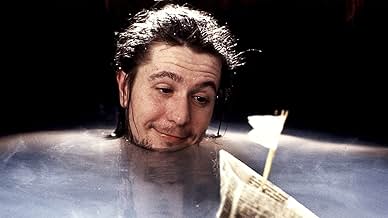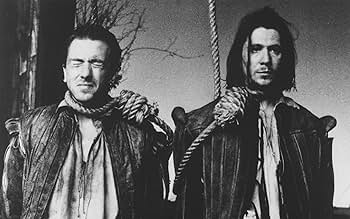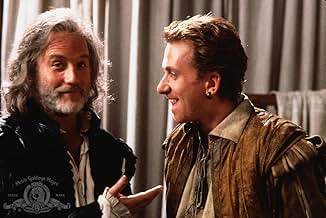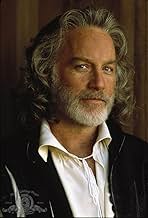Rosencrantz & Guildenstern Estão Mortos
Título original: Rosencrantz & Guildenstern Are Dead
Dois personagens secundários da peça 'Hamlet' tropeçam, desconhecendo suas vidas planejadas e incapazes de se desviar delas.Dois personagens secundários da peça 'Hamlet' tropeçam, desconhecendo suas vidas planejadas e incapazes de se desviar delas.Dois personagens secundários da peça 'Hamlet' tropeçam, desconhecendo suas vidas planejadas e incapazes de se desviar delas.
- Direção
- Roteirista
- Artistas
- Prêmios
- 3 vitórias e 2 indicações no total
Serge Soric
- Tragedian
- (as Srdjan Soric)
Sven Medvesek
- Laertes
- (as Sven Medvesck)
Avaliações em destaque
Okay, so you may want to brush up on your knowledge of "Hamlet" before viewing "Rosencrantz and Guildenstern Are Dead", Tom Stoppard's big screen adaptation of his own classic play. Please don't let that frighten you away, or you'll miss out on a seriously funny movie.
The lead roles are extremely well cast. Gary Oldman is hilarious as sweet, befuddled Rosencrantz. Tim Roth's angry, frustrated Guildenstern is the perfect complement. They make a great team.
Stoppard's film has a sprightly step even when raising a few cosmic questions. It's the perfect tonic for some of the more pompous cinematic takes on Shakespeare, and even the Bard would appreciate its sparkling wordplay.
The lead roles are extremely well cast. Gary Oldman is hilarious as sweet, befuddled Rosencrantz. Tim Roth's angry, frustrated Guildenstern is the perfect complement. They make a great team.
Stoppard's film has a sprightly step even when raising a few cosmic questions. It's the perfect tonic for some of the more pompous cinematic takes on Shakespeare, and even the Bard would appreciate its sparkling wordplay.
This film is one of the most glorious and intriguing examples of modern cinematic art I have ever encountered. I am not going to run you through the entire movie, as that has been done several times on here already, but I would like to clear up a few misunderstandings and harsh words that I have read in previous comments.
First and foremost, I have not seen or read the play (although I am looking forward to it) and I was perfectly able to understand all of the so-called "high-brow" concepts like fate, time, freewill, self-awareness, and the light peppering of existential musings (my favorite of which is the "...well at least I'm not dead." speech). The first time I watched this film I was very fascinated, amused, and slightly confused. These Pythoneon nonsensical scenes that some of you are reffering to were a bit difficult to understand, but after a second viewing they all made perfect sense. It does not take a genius to see the multiple layers and metaphors being used in this film. As for being totally lost without first seeing the play, that is rediculous. It took a bit of thinking and rewinding, but it is comprehensible, and after you figure it all out for yourself it is very rewarding and adds to the enjoyment, and genius, of the film. For example, the first time i watched this movie I was very confused by the pages of manuscript randomly floating around after R&G encounter the players for the first time. But once you realize that the lead player is fully self-aware, has been through these scenarios (the play "Hamlet") several times with a full consciousness and memory of the events (demonstrated rather obviously by his full knowledge of future events, the play that his troupe rehearses in front of R&G wich is an exact copy of "Hamlet", etc.) it makes for a wonderful metaphor demonstrating what has happened to the original play (Hamlet) now that some of its more flat characters are starting to think outside the script, so to speak, and become a bit more round.
Well, I could go on forever about this masterpiece, and maybe I will at a later date, but for now I just wanted you know that this film is anything but simple. If you can manage to put a little thought into what you are seeing and hearing you will find that it is perhaps the most complex, multi-layered, intuitively rewarding film ever created.
P.S. I am afraid this film is not widely accessible to the majority of movie watchers, which really saddens me because it is truly an amazing work of art. I would very much like to remedy this. So, if you have watched this movie at least 2 times, and are still puzzled by some of the scenes, please feel free to email me and I would be happy to explain anything that might heighten your understanding of the film.
First and foremost, I have not seen or read the play (although I am looking forward to it) and I was perfectly able to understand all of the so-called "high-brow" concepts like fate, time, freewill, self-awareness, and the light peppering of existential musings (my favorite of which is the "...well at least I'm not dead." speech). The first time I watched this film I was very fascinated, amused, and slightly confused. These Pythoneon nonsensical scenes that some of you are reffering to were a bit difficult to understand, but after a second viewing they all made perfect sense. It does not take a genius to see the multiple layers and metaphors being used in this film. As for being totally lost without first seeing the play, that is rediculous. It took a bit of thinking and rewinding, but it is comprehensible, and after you figure it all out for yourself it is very rewarding and adds to the enjoyment, and genius, of the film. For example, the first time i watched this movie I was very confused by the pages of manuscript randomly floating around after R&G encounter the players for the first time. But once you realize that the lead player is fully self-aware, has been through these scenarios (the play "Hamlet") several times with a full consciousness and memory of the events (demonstrated rather obviously by his full knowledge of future events, the play that his troupe rehearses in front of R&G wich is an exact copy of "Hamlet", etc.) it makes for a wonderful metaphor demonstrating what has happened to the original play (Hamlet) now that some of its more flat characters are starting to think outside the script, so to speak, and become a bit more round.
Well, I could go on forever about this masterpiece, and maybe I will at a later date, but for now I just wanted you know that this film is anything but simple. If you can manage to put a little thought into what you are seeing and hearing you will find that it is perhaps the most complex, multi-layered, intuitively rewarding film ever created.
P.S. I am afraid this film is not widely accessible to the majority of movie watchers, which really saddens me because it is truly an amazing work of art. I would very much like to remedy this. So, if you have watched this movie at least 2 times, and are still puzzled by some of the scenes, please feel free to email me and I would be happy to explain anything that might heighten your understanding of the film.
"There is no choice involved. The bad end unhappily, the good unluckily. That is what tragedy means." - The Player
Out of all of the timeless Shakespearian tragic protagonists or even supporting players, few would prove less memorable and recognized than Rosencrantz and Guildenstern, background players in Hamlet who are given no development, little purpose, and, apart from a single line mentioning their offstage deaths in passing, no closure. As such, it is nothing less than a delightfully ingenious decision on writer/director Tom Stoppard's part to re- examine Hamlet from the perspective of the two characters who seldom play any part in it, and in between question their purpose, their reason for being there, what they are attempting to accomplish and their inability to remember anything before being brought into the story. Such a work is Rosencrantz & Guildenstern are Dead: an absurdist, existential take on the tragedy of the Prince of Denmark, for which rational description proves fleeting and incomplete. Consider the film as an amalgamation of its source material, Shakespeare's Hamlet, Beckett's absurdist Waiting for Godot, and the irreverent comedic stylings of Abbot and Costello and Monty Python - and even this fails to exactly capture the unique stylistic blend that is the film.
As with many such experimental works, Rosencrantz & Guildenstern are Dead will likely not prove appealing to all tastes, particularly not for those devoid of a healthy tolerance for theater of the absurd and existential or otherwise philosophical ramblings with no real definitive outcome or purpose. However, Stoppard's exquisitely witty and verbose script is rattled off at a breakneck pace, making up for the occasional lull in pacing and absurdist silent interludes which fail to add much to the plot. Despite its theatrical origins, the work makes a surprisingly fluid transition to film, with some fittingly minimalist cinematography helping it feel less stage oriented. The somewhat low budget appearance of the production, as opposed to being a detriment, actually adds an endearing and introspective quality to the film, as if meant to look like it was being performed by a low budget theater group. Similarly, the film's musical score is just bizarre and comically unsettling enough to promote the perfect offbeat mood throughout.
Stoppard's work also deserves tremendous commendations for his work's introspective challenging conventions of theater and audience expectations by leaving many plot points unexplained or up for subjective interpretation. The constant question as to whether the two titular characters are actors, seemingly so into character that they have forgotten the nature of their putting on a play (pages from the script of Hamlet drift tantalizingly around the scenery throughout, suggesting this possibility) or the actual characters themselves within the world of the play, unaware as to their fictional nature, ultimate lack of purpose and inescapable impending fate is never fully resolved, and ultimately never seems to make much of a difference. The play's treatment of fatalism and pre-determination in artistic works is similarly intriguing - as Dreyfus' Player (seemingly the only fully informed character in the play) explains, the events which befall the two bewildered protagonists are not decided, but "written". However, Stoppard never draws the distinction between introspective artistry or just plain absurdity, leaving it up to his audience to fill in many of the film's gaps and come to their own conclusions, but his inspired storyline proves consistently entertaining in the midst of its frequently nonsensical philosophical banter. Similarly, the script's exploration of the frequently misleading and deceptive power and ambiguity of words leads for some turns of phrases worthy of Shakespeare himself, whose dialogue style Stoppard frequently mocks and simultaneously pays tribute to.
Without such an accomplished cast putting their own unique spin on the material, it is hard to imagine such a difficult play being transposed into such a highly enjoyable movie. Gary Oldman and Tim Roth are perfectly cast as the consistently bewildered titular duo, and their quirky chemistry and impeccable comedic timing makes for some of the most enjoyable back and forth routines in recent memory (the verbal tennis match is an abiding classic, but is only a fraction of the comedic brilliance the two muster up) - an absurdist Abbot and Costello if you will, with Oldman's loopy Rosencrantz making a ideal foil for Roth's curt straight man Guildenstern. A fittingly grandiose Richard Dreyfus is a consistent scene stealer, making superb use of many of the best lines in the script as the lead player in the theatrical group performing for the royal family. Similarly, Iain Glen makes a suitably manic Hamlet, and Donald Sumpter and Joanna Miles prove wonderfully theatrical as King Claudius and Queen Gertrude, always lost in the wistful world of the play.
Unconventional, bizarre, thought provoking and consistently funny, Rosencrantz & Guildenstern are Dead will certainly isolate certain audiences, in particular those with little tolerance for theater of the absurd. But for those willing to partake in material outside the parameters of the mainstream will experience an intelligent, fast paced and astutely acted metaphysical comedy, one whose blend of unpretentious philosophy and irreverent comedy proves difficult to resist.
-8.5/10
Out of all of the timeless Shakespearian tragic protagonists or even supporting players, few would prove less memorable and recognized than Rosencrantz and Guildenstern, background players in Hamlet who are given no development, little purpose, and, apart from a single line mentioning their offstage deaths in passing, no closure. As such, it is nothing less than a delightfully ingenious decision on writer/director Tom Stoppard's part to re- examine Hamlet from the perspective of the two characters who seldom play any part in it, and in between question their purpose, their reason for being there, what they are attempting to accomplish and their inability to remember anything before being brought into the story. Such a work is Rosencrantz & Guildenstern are Dead: an absurdist, existential take on the tragedy of the Prince of Denmark, for which rational description proves fleeting and incomplete. Consider the film as an amalgamation of its source material, Shakespeare's Hamlet, Beckett's absurdist Waiting for Godot, and the irreverent comedic stylings of Abbot and Costello and Monty Python - and even this fails to exactly capture the unique stylistic blend that is the film.
As with many such experimental works, Rosencrantz & Guildenstern are Dead will likely not prove appealing to all tastes, particularly not for those devoid of a healthy tolerance for theater of the absurd and existential or otherwise philosophical ramblings with no real definitive outcome or purpose. However, Stoppard's exquisitely witty and verbose script is rattled off at a breakneck pace, making up for the occasional lull in pacing and absurdist silent interludes which fail to add much to the plot. Despite its theatrical origins, the work makes a surprisingly fluid transition to film, with some fittingly minimalist cinematography helping it feel less stage oriented. The somewhat low budget appearance of the production, as opposed to being a detriment, actually adds an endearing and introspective quality to the film, as if meant to look like it was being performed by a low budget theater group. Similarly, the film's musical score is just bizarre and comically unsettling enough to promote the perfect offbeat mood throughout.
Stoppard's work also deserves tremendous commendations for his work's introspective challenging conventions of theater and audience expectations by leaving many plot points unexplained or up for subjective interpretation. The constant question as to whether the two titular characters are actors, seemingly so into character that they have forgotten the nature of their putting on a play (pages from the script of Hamlet drift tantalizingly around the scenery throughout, suggesting this possibility) or the actual characters themselves within the world of the play, unaware as to their fictional nature, ultimate lack of purpose and inescapable impending fate is never fully resolved, and ultimately never seems to make much of a difference. The play's treatment of fatalism and pre-determination in artistic works is similarly intriguing - as Dreyfus' Player (seemingly the only fully informed character in the play) explains, the events which befall the two bewildered protagonists are not decided, but "written". However, Stoppard never draws the distinction between introspective artistry or just plain absurdity, leaving it up to his audience to fill in many of the film's gaps and come to their own conclusions, but his inspired storyline proves consistently entertaining in the midst of its frequently nonsensical philosophical banter. Similarly, the script's exploration of the frequently misleading and deceptive power and ambiguity of words leads for some turns of phrases worthy of Shakespeare himself, whose dialogue style Stoppard frequently mocks and simultaneously pays tribute to.
Without such an accomplished cast putting their own unique spin on the material, it is hard to imagine such a difficult play being transposed into such a highly enjoyable movie. Gary Oldman and Tim Roth are perfectly cast as the consistently bewildered titular duo, and their quirky chemistry and impeccable comedic timing makes for some of the most enjoyable back and forth routines in recent memory (the verbal tennis match is an abiding classic, but is only a fraction of the comedic brilliance the two muster up) - an absurdist Abbot and Costello if you will, with Oldman's loopy Rosencrantz making a ideal foil for Roth's curt straight man Guildenstern. A fittingly grandiose Richard Dreyfus is a consistent scene stealer, making superb use of many of the best lines in the script as the lead player in the theatrical group performing for the royal family. Similarly, Iain Glen makes a suitably manic Hamlet, and Donald Sumpter and Joanna Miles prove wonderfully theatrical as King Claudius and Queen Gertrude, always lost in the wistful world of the play.
Unconventional, bizarre, thought provoking and consistently funny, Rosencrantz & Guildenstern are Dead will certainly isolate certain audiences, in particular those with little tolerance for theater of the absurd. But for those willing to partake in material outside the parameters of the mainstream will experience an intelligent, fast paced and astutely acted metaphysical comedy, one whose blend of unpretentious philosophy and irreverent comedy proves difficult to resist.
-8.5/10
I love this movie. I remember first watching it in a college class talking about different takes, different points of view. Watching it again now and I find myself liking it even more. It's such an interesting film with an anti-narrative and such a wonderfully, deliberately bizarre structure. Rose & Guild follows the story of our titular characters but it's really more about what they're doing off to the side of the main story of Hamlet. So much so that they just randomly show up in places when the story demands it and they don't even know how they got there.
It's weird and it absolutely isn't going to work for some people but I love this one. It's so unique and fun, creative and inventive and I try to give props to any movie setting out to be as different as this one especially when it actually succeeds at what it's trying to do. Strong recommend here, whether you're familiar with Hamlet or not, though a loose understanding of the play would likely be beneficial.
It's weird and it absolutely isn't going to work for some people but I love this one. It's so unique and fun, creative and inventive and I try to give props to any movie setting out to be as different as this one especially when it actually succeeds at what it's trying to do. Strong recommend here, whether you're familiar with Hamlet or not, though a loose understanding of the play would likely be beneficial.
Rosencrantz and Guildenstern Are Dead was one of my favourite films whilst growing up. The movie follows two irrelevant characters (irrelevant in that although they served a significant purpose, their characters were not developed in any depth... Rosencrantz and Guildenstern, as individuals, were relatively unimportant) through one of the most renowned stories ever told (Hamlet). It is a film about two characters that are completely unaware of the magnitude of the events taking place around them. This carries on throughout the entire film, and is also evidenced in their accidental discoveries of significant historical scientific findings (such as the steam engine or the concept of gravity). The characters stumble their way through the film, unaware of the consequences to their actions or their significance or importance.
The characters spend the entire film coming to terms with their existence. Shakespeare didn't provide any detailed character development of either Rosencrantz or Guildenstern, and as such, they are left confused as to the purpose of their own existence.
The film also looks at the concept of a predetermined destiny. Rosencrantz and Guildenstern's fate is already determined before the film begins. And although they play an important role in one of the greatest stories ever told, they are completely unaware of their destiny; they are merely victims of circumstance.
I should also note that the constant banter between the two characters (specifically in their 'Game of Questions') is pure quality.
The characters spend the entire film coming to terms with their existence. Shakespeare didn't provide any detailed character development of either Rosencrantz or Guildenstern, and as such, they are left confused as to the purpose of their own existence.
The film also looks at the concept of a predetermined destiny. Rosencrantz and Guildenstern's fate is already determined before the film begins. And although they play an important role in one of the greatest stories ever told, they are completely unaware of their destiny; they are merely victims of circumstance.
I should also note that the constant banter between the two characters (specifically in their 'Game of Questions') is pure quality.
Você sabia?
- CuriosidadesOriginally, the two leads (who appropriately spend the movie mixing up their own names) were cast the other way around.
- Erros de gravaçãoThroughout the movie there are scenes where day suddenly changes to night and vice versa. This is a running gag of Tom Stoppard plays which often have "time jumps" written into the stage directions.
- Citações
Rosencrantz: Do you think Death could possibly be a boat?
Guildenstern: No, no, no... Death is "not." Death isn't. Take my meaning? Death is the ultimate negative. Not-being. You can't not be on a boat.
Rosencrantz: I've frequently not been on boats.
Guildenstern: No, no... What you've been is not on boats.
- ConexõesEdited into Spisok korabley (2008)
Principais escolhas
Faça login para avaliar e ver a lista de recomendações personalizadas
- How long is Rosencrantz & Guildenstern Are Dead?Fornecido pela Alexa
Detalhes
- Data de lançamento
- Países de origem
- Idioma
- Também conhecido como
- Rosencrantz y Guildenstern han muerto
- Locações de filme
- Empresas de produção
- Consulte mais créditos da empresa na IMDbPro
Bilheteria
- Faturamento bruto nos EUA e Canadá
- US$ 739.104
- Fim de semana de estreia nos EUA e Canadá
- US$ 24.004
- 10 de fev. de 1991
- Faturamento bruto mundial
- US$ 739.104
- Tempo de duração
- 1 h 57 min(117 min)
- Cor
- Proporção
- 1.85 : 1
Contribua para esta página
Sugerir uma alteração ou adicionar conteúdo ausente



















